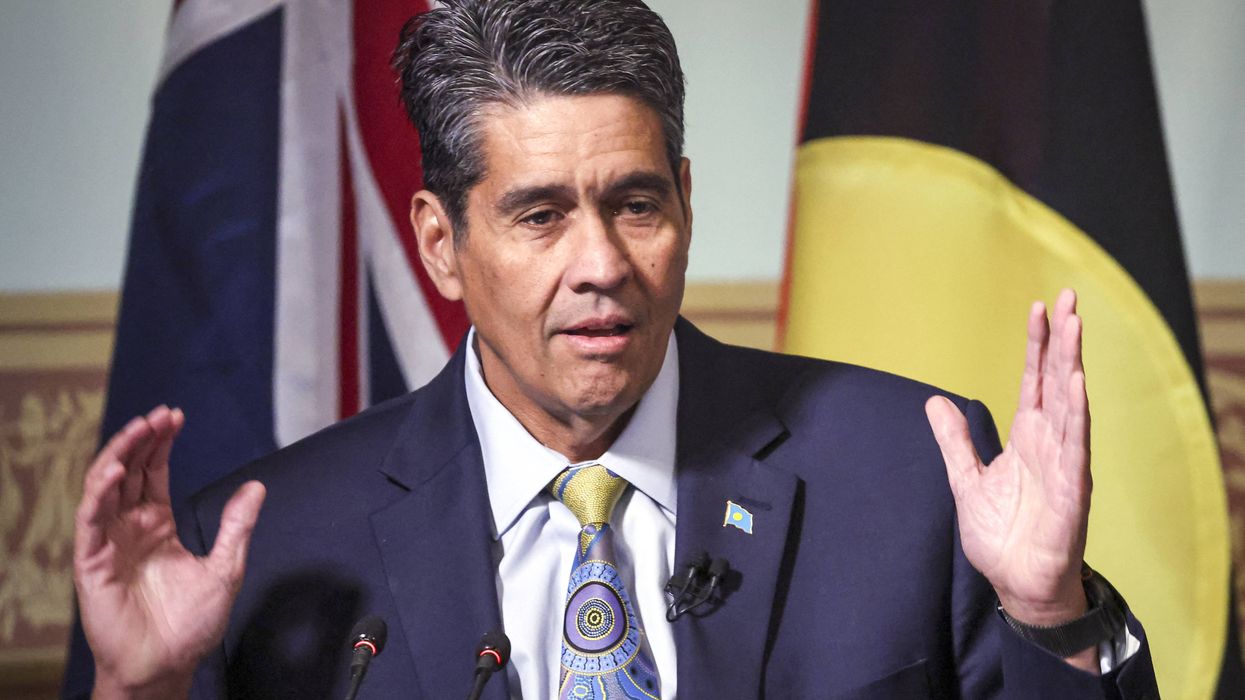July, 10 2014, 03:16pm EDT

Lawsuit Challenges Government's 'Suspicious Activity Report' Program
FBI created counterterrorism files for plaintiffs’ innocuous activities
SAN FRANCISCO
Civil rights groups filed a lawsuit today challenging the legality of the federal government's controversial Suspicious Activity Reporting (SAR) program. The lawsuit, filed by the American Civil Liberties Union of California, the national ACLU, and Asian Americans Advancing Justice-Asian Law Caucus, was brought on behalf of five Americans who had their information entered into law enforcement databases for innocent things like taking pictures, buying computers, or standing in a train station, and were then subjected to investigation.
"This domestic surveillance program wrongly targets First Amendment-protected activities, encourages racial and religious profiling, and violates federal law," said Linda Lye, staff attorney with the ACLU of Northern California. "The Justice Department's own rules say that there should be reasonable suspicion before creating a record on someone, but the government's instructions to local police are that they should write up SARs even if there's no valid reason to suspect a person of doing anything wrong."
A Justice Department regulation dating to 1978 prohibits the collection and dissemination of "criminal intelligence information" unless there is "reasonable suspicion" of criminal activity. However, the Justice Department's standard for SARs doesn't require reasonable suspicion of wrongdoing, only behavior that "may be indicative" of terrorism planning "or other illicit intention."
The plaintiffs in the lawsuit have learned that such a low bar can cover virtually anything. James Prigoff is an 86-year-old renowned photographer of public art who has lectured at numerous universities and had his work exhibited at the Smithsonian and other museums around the world. In 2004, he was in Boston taking pictures of a famous piece of public art called the Rainbow Swash, which is painted on a natural gas storage tank. Private security guards told him to stop. Several months later, the FBI went to Prigoff's home in Sacramento to question him about his activities in Boston and also contacted at least one neighbor about him - a clear indication that a report identifying him as a suspicious person with a potential connection to terrorism had been written and distributed nationwide.
"All I was doing was taking pictures in a public place, and now I'm apparently in a government terrorism database for decades," said Prigoff. "This is supposed to be a free country, where the government isn't supposed to be tracking you if you're not doing anything wrong. I lived through the McCarthy era, and I know how false accusations, surveillance, and keeping files on innocent people can destroy careers and lives. I am deeply troubled that the SAR program may be recreating that same climate of false accusation and fear today."
Another plaintiff, Wiley Gill, was the subject of a 2012 SAR that was obtained by the ACLU of California through a Public Records Act request. He was identified as a "Suspicious Male Subject in Possession of Flight Simulator Game." At the time, he was likely looking at websites on his computer about video games. The SAR identifies Gill as "worthy of note" because he converted to Islam and has a "pious demeanor."
The SAR was submitted to one of the nation's 78 "fusion centers," which are operated by state and local government agencies and are meant to collect and analyze threat-related information. If an analyst believes that a report meets the SAR program's standards, he or she uploads it to one or more national databases, where it can remain for up to 30 years. In the case of Gill, the SAR was forwarded to the FBI, which then opened a file on him.
"The only reason that someone deemed Mr. Gill 'suspicious' is because he is a devout Muslim, not because he has done anything wrong," said Asian Americans Advancing Justice-Asian Law Caucus attorney Nasrina Bargzie. "With such a lax standard it's not surprising that the result is religious profiling of this nature. Racial and religious profiling of Arab, Middle Eastern, Muslim and South Asian communities needs to stop."
Last year, a U.S. Government Accountability Office investigation found that the SAR program had failed to demonstrate any arrests, convictions, or thwarted threats, even though tens of thousands of SARs have been uploaded to government databases. In 2012, a bipartisan Senate subcommittee report found that fusion centers have not identified a single terrorist threat, and that similar intelligence reporting "potentially endangered the civil liberties or legal privacy protections of the U.S. persons they mentioned."
"The SAR program is an intrusion into the privacy of citizens and is unwarranted," said Jonathan Loeb, co-lead counsel in the lawsuit and a partner at Bingham McCutchen. "Furthermore, the program was implemented without the appropriate notice and opportunity for the public to comment."
No changes to the SAR program have been made since the GAO and Senate reports were issued, despite repeated calls from a coalition of civil rights and other organizations.
Today's complaint is at:
aclu.org/national-security/gill-v-doj-complaint
Detailed descriptions of the plaintiff's experiences are at:
aclu.org/files/assets/sar_complaint.pdf#page=21
Almost two thousand Suspicious Activity Reports obtained by the ACLU of California and released in 2013 are at:
aclu.org/blog/national-security-technology-and-liberty/government-spying-you-aclu-releases-new-evidence
The American Civil Liberties Union was founded in 1920 and is our nation's guardian of liberty. The ACLU works in the courts, legislatures and communities to defend and preserve the individual rights and liberties guaranteed to all people in this country by the Constitution and laws of the United States.
(212) 549-2666LATEST NEWS
'Unhinged' Trump Wishes 'Merry Christmas to All, Including the Radical Left Scum'
"Nothing more Christian than to be a hateful wretched fuck on Jesus’ birthday," quipped one critic.
Dec 25, 2025
In a message called typically on-brand by observers, US President Donald Trump wished "Merry Christmas to all"—including his political opponents, whom he described in decidedly unchristlike language.
"Merry Christmas to all, including the Radical Left Scum that is doing everything possible to destroy our Country, but are failing badly," Trump said Christmas Eve on his Truth Social network.
"We no longer have Open Borders, Men in Women’s Sports, Transgender for Everyone, or Weak Law Enforcement," the president added. "What we do have is a Record Stock Market and 401K’s, Lowest Crime numbers in decades, No Inflation, and yesterday, a 4.3 GDP, two points better than expected. Tariffs have given us Trillions of Dollars in Growth and Prosperity, and the strongest National Security we have ever had. We are respected again, perhaps like never before. God Bless America!!!"
While nothing new—Trump has used past Christmas messages to tell people he doesn't like to "go to hell" and "rot in hell"—observers, including some MAGA supporters, were still left shaking their heads.
"Radical Left Scum" 😂🤣😂🤣😂🤣Christmas greetings from a liar, traitor, pedophile, and overall shitstain upon society.
[image or embed]
— Bill Madden (@maddenifico.bsky.social) December 24, 2025 at 9:00 PM
"Nothing more Christian than to be a hateful wretched fuck on Jesus’ birthday!" liberal political commentator Dean Withers said on X.
Another popular X account posted: "A sitting president of the United States using Christmas Day to spew venom at fellow Americans he calls 'Radical Left Scum' isn’t just unpresidential—it’s unhinged, un-Christian, and utterly beneath the office."
"This is the behavior of a bitter, small man who can’t even pretend to unify for one holy day," she added. "Shameful. Disgraceful. Pathetic."
Keep ReadingShow Less
Palau Signs Controversial $7.5 Million Deal to Take 75 Trump Deportees
"What if we spent the $100,000 per person in America setting them up with housing assistance, healthcare, education, etc?" asked one critic.
Dec 25, 2025
Palau said Wednesday that it has agreed to take in up to 75 people deported from the United States during President Donald Trump's purge of unauthorized immigrants in exchange for millions of dollars in financial assistance—a move that has sparked considerable opposition among the Pacific archipelago nation's roughly 18,000 inhabitants.
The office of Palauan President Surangel Whipps Jr. announced a memorandum of understanding with the United States under which the country will receive $7.5 million in assistance in exchange for taking in 75 third-country deportees who cannot be repatriated to their countries of origin.
Earlier this week, US State Department Principal Deputy Spokesperson Tommy Pigott said the people who will be sent to Palau have “no known criminal histories," as is the case with the vast majority of unauthorized immigrants in the United States, who have committed no crime other than the mere misdemeanor of entering the country illegally.
However, Palauans have voiced concerns over US Secretary of State Marco Rubio's remarks during a Cabinet meeting earlier this year in which he said that, “We want to send some of the most despicable human beings—perverts, pedophiles, and child rapists—to your countries as a favor to us."
Whipps said Wednesday that the relocation plan involves “people seeking safety and stability."
“These are not criminals,” the president said during earlier debate on the proposal. “Their only offense was entering the United States illegally and working without proper permits.”
However, Palau's Congress and its influential Council of Chiefs have twice rejected the transfers.
Piggot's statement "highlighted US commitments to partner with Palau on strengthening the country’s healthcare infrastructure, increasing Palau’s capacity to combat transnational crime and drug trafficking, and bolstering Palau’s civil service pension system."
Palau, which was administered by the US from 1947-94 and is now associated with the United States under the 1994 Compact of Free Association, which guaranteed the country nearly $900 million economic aid over 20 years in exchange for exclusive US military access.
The country's foreign policy often tracks closely to that of the US. For example, Palau is sometimes among the handful of usually similarly small nations that vote along with the United States and Israel against United Nations resolutions condemning Israeli crimes or affirming Palestinian rights.
Other developing nations including Eswatini, Rwanda, South Sudan, and Uganda have also agreed to take in US deportees or are considering doing so.
Reactions to the US-Palau agreement drew criticism on social media, where one X user called the deal a "bribe" and another popular Bluesky account asked, "What if we spent the $100,000 per person in America setting them up with housing assistance, healthcare, education, etc?"
Keep ReadingShow Less
Trump 'Choosing From the War Crimes Menu' With 'Quarantine' on Venezuela Oil Exports
"Economic strangulation is warfare and civilians always pay the price," lamented CodePink.
Dec 25, 2025
President Donald Trump has ordered US military forces to further escalate their aggression against Venezuela by enforcing a "quarantine" on the South American nation's oil—by far its main export—in what one peace group called an attempted act of "economic strangulation."
"While military options still exist, the focus is to first use economic pressure by enforcing sanctions to reach the outcome the White House is looking [for]," a US official, who spoke on condition of anonymity, told Reuters.
The move follows the deployment of an armada of US warships and thousands of troops to the region, threats to invade Venezuela, oil tanker seizures off the Venezuelan coast, Trump's authorization of covert CIA action against the socialist government of Venezuelan President Nicolás Maduro, and airstrikes against boats allegedly running drugs in the Caribbean Sea and Pacific Ocean that have killed more than 100 people in what critics say are murders and likely war crimes.
This, atop existing economic sanctions that experts say have killed tens of thousands of Venezuelans since they were first imposed during the first Trump administration in 2017.
"The efforts so far have put tremendous pressure on Maduro, and the belief is that by late January, Venezuela will be facing an economic calamity unless it agrees to make significant concessions to the US," the official told Reuters.
The official's use of the word "quarantine" evoked the 1962 Cuban Missile Crisis, an existential standoff that occurred after the John F. Kennedy administration imposed a naval blockade around Cuba to prevent Soviet nuclear missiles from being deployed on the island, even as the US was surrounding the Soviet Union with nuclear weapons.
"This is an illegal blockade," the women-led peace group CodePink said in response to the Reuters report. "Calling it a 'quarantine' doesn’t change the reality. The US regime is using hunger as a weapon of war to force regime change in Venezuela. Economic strangulation is warfare and civilians always pay the price. The US is a regime of terror."
Critics have also compared Trump's aggression to the George W. Bush administration's buildup to the invasion and occupation of Iraq, initially referred to as Operation Iraqi Liberation (OIL). But unlike Bush, Trump—who derided Bush for not seizing Iraq's petroleum resources as spoils of war—has openly acknowledged his desire to take Venezuela's oil.
"Maybe we will sell it, maybe we will keep it,” he Trump said on Monday. “Maybe we’ll use it in the strategic reserves. We’re keeping the ships also.”
On Wednesday, a panel of United Nations experts said that the US blockade and boat strikes constitute "illegal armed aggression" against Venezuela.
Multiple efforts by US lawmakers—mostly Democrats, but also a handful of anti-war Republicans—to pass a war powers resolution blocking the Trump administration from bombing boats or attacking Venezuela have failed.
The blockade and vessel seizures have paralyzed Venezuela's oil exports. Ports are clogged with full tankers whose operators are fearful of entering international waters. Venezuela-bound tankers have also turned back for fear of seizure. Although Venezuelan military vessels are accompanying tankers, the escorts stop once the ships reach international waters.
According to the New York Times, Venezuela is considering putting armed troops aboard tankers bound for China, which, along with Russia, has pledged its support—but little more—for Caracas.
Keep ReadingShow Less
Most Popular


